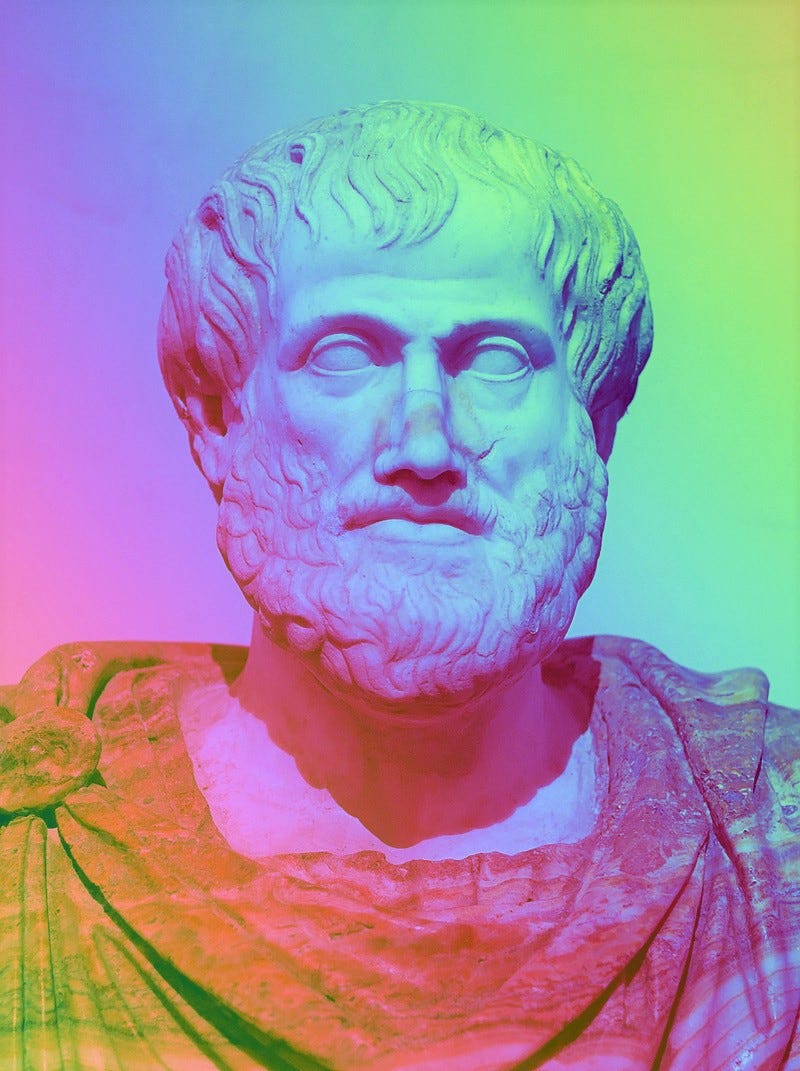35. Aristotle & the doctrine of grey
A quick post on a common misunderstanding of virtue.
35.
The Golden Mean
Aristotle is famous for his ethical doctrine of the ‘golden mean.' Here it is described by the Stanford Encyclopedia of Philosophy, which will suffice for our current purpose:
[In Aristotle's theory], every ethical virtue is a condition intermediate (a “golden mean” as it is popularly known) between two other states, one involving excess, and the other deficiency (1106a26—b28).
The usual example describes bravery as a mean between cowardice and recklessness. If a general is not brave enough, he evades battles he should fight, and may be a coward. If he's 'too brave', he seeks battles with no chance of victory, and dashes his army to pieces for no gain, and we’d call him reckless.
You don't want either general on your side - you want one who occupies the middle.
Sounds pretty good. I'm a fan. But this idea is frequently misunderstood in practice.
The grey and frozen mean?
The most common misunderstanding I’ve seen probably implicates the use of the term 'mean' to describe Aristotle's theory.
The mean of a spectrum between white and black is grey.
But should we be grey regarding every spectrum of character traits?
Should we, rather than being aggressive or being passive, always be... a little aggressive and a little passive?
Should we, rather than being expressive or silent, always... express ourselves a little bit?
Should we, rather than being very happy or very sad, always be... kind of fine?
A doctrine of flexibility
My own answer takes Aristotle as not arguing for a policy of grey stuck-in-the-middle-ness, but rather for a wise and judicious flexibility, which is highly tuned to the reality of a given circumstance.
Referencing this idea in "Mastery as Good Taste", I used a metaphor that I continue to find fruitful:
You don’t want to always turn left, or always turn right; but neither should you ‘always drive in the middle’.
To get where you’re going, you need to turn with the road.
And while I haven't studied Aristotle as much as I should, I believe this take is compatible with if not directly enunciated in the picture he tried to paint. SEP again:
In this respect, Aristotle says, the virtues are no different from technical skills: every skilled worker knows how to avoid excess and deficiency, and is in a condition intermediate between two extremes.
On this lens, virtues remain understandable as character traits — but rather than being abstract tags applied to people we like, they bottom out as patterns of skillful action, arising from the shape of the soul. Skill requires awareness, sensitivity to important details, and sophistication.
This version of the theory is confirmed by what we frequently observe in highly skilled people. To know how to play a social situation, market a product, or train a disobedient dog, they want to know the details of the particular case.
When virtue involves extremity
It's not that there's a range of frozen perfection in between two extremes, which we are demanded to occupy at all times. If anything, I’d argue that the most virtuous people are more able to occupy extremes. Instead of being stuck in tension, confusion, habit or ignorance, they remain attentive and free to choose.
When an extreme is occupied with success, rather than by error, we call it by a different name. In our military example, the flexible general with access to all points on a spectrum is not a coward when he flees an unwinnable battle; he's just being smart, biding his time like a rattlesnake in the grass. When he stakes his mens’ lives on a bold and daring suicide mission, ‘just so crazy it might work’—he's not being reckless, but wisely weighing the context of the territory, troop morale, timing, weather and so on. Again, he's just being smart.
As the internet saying goes - get you a woman who can do both.




